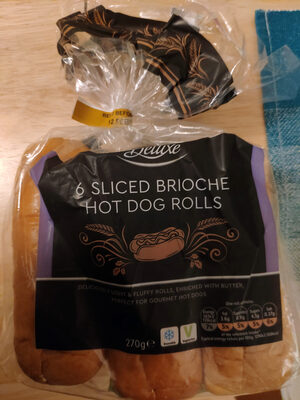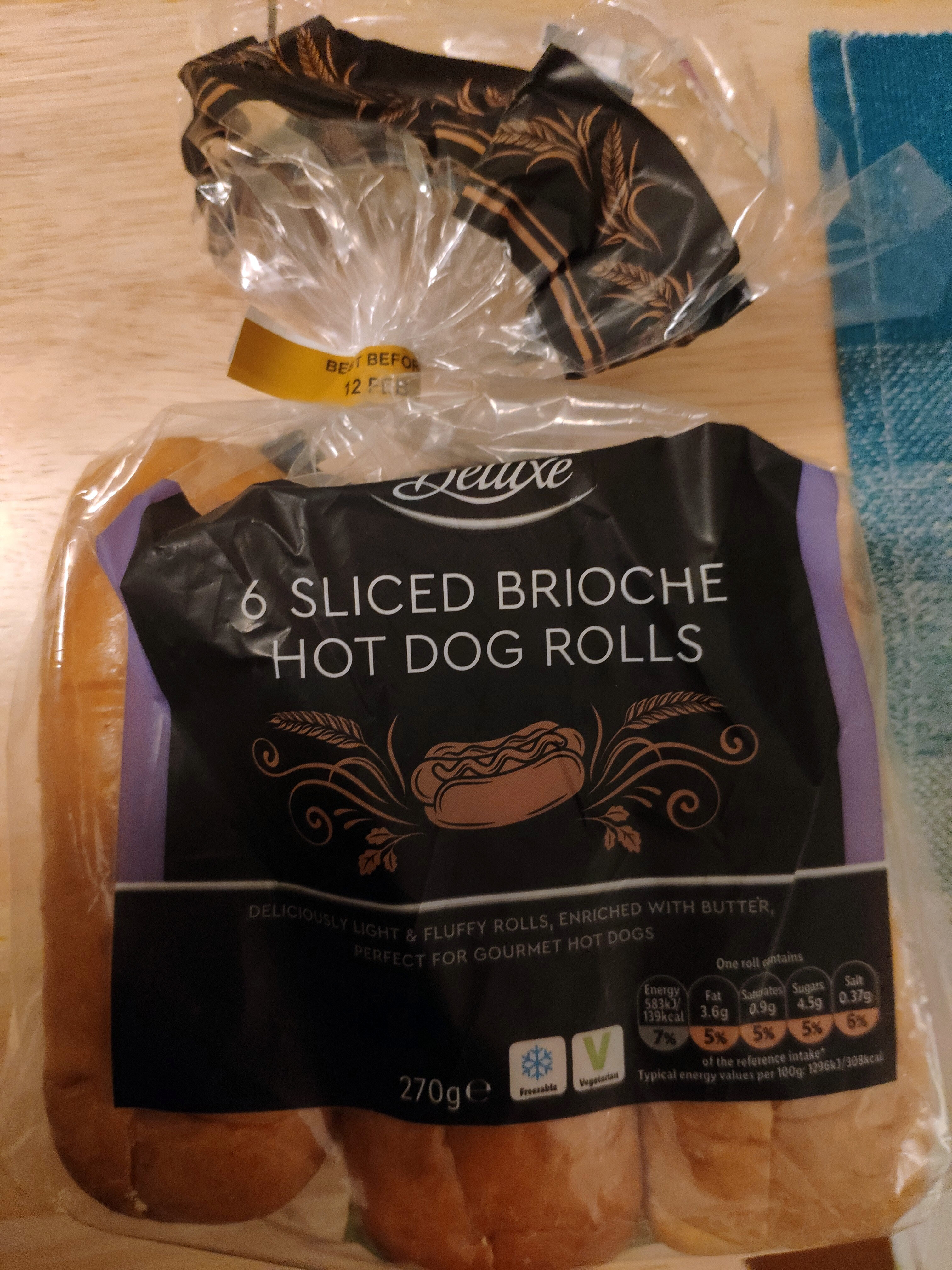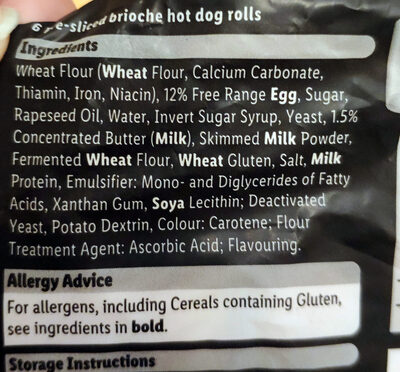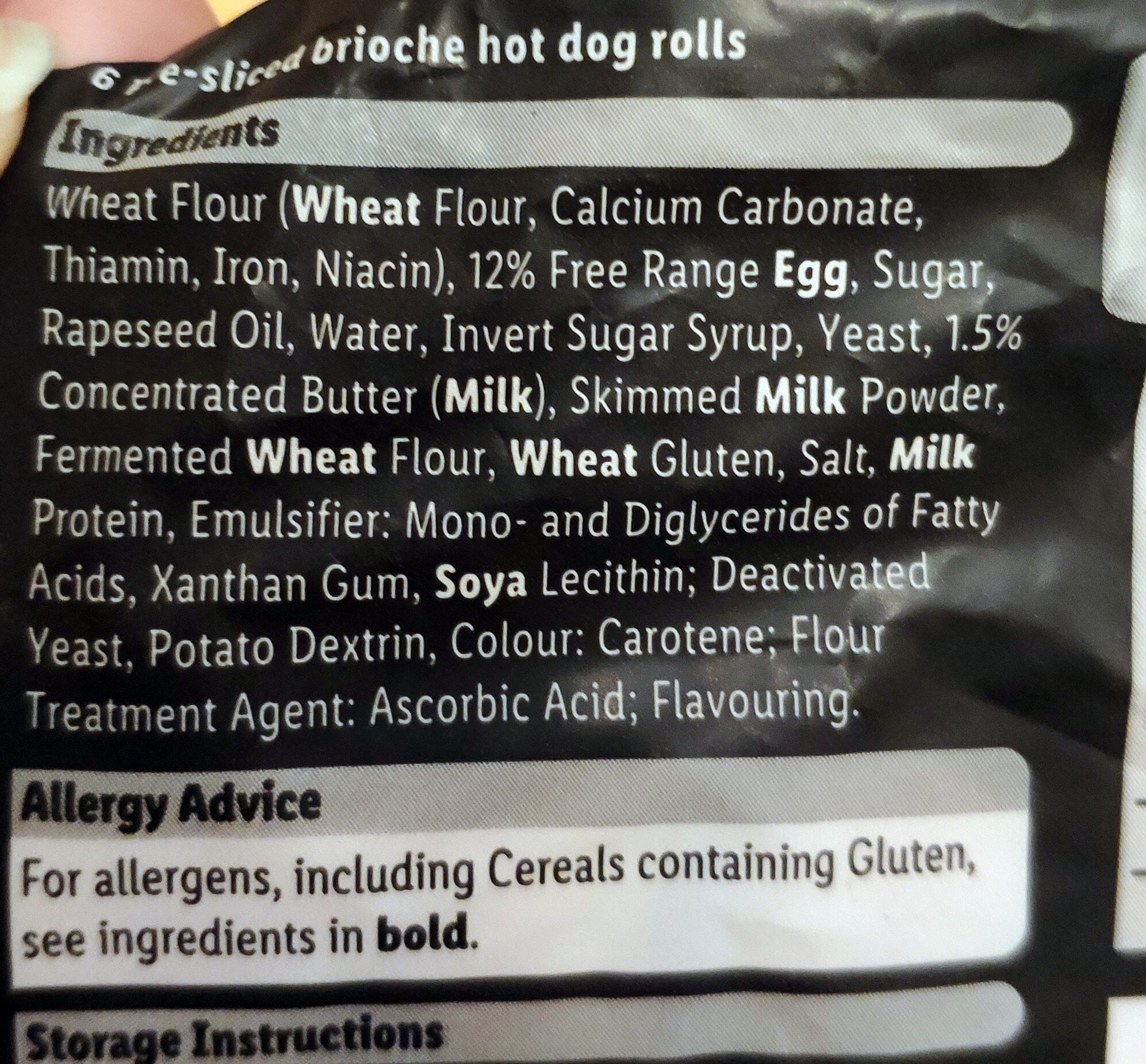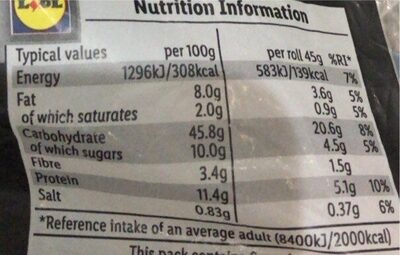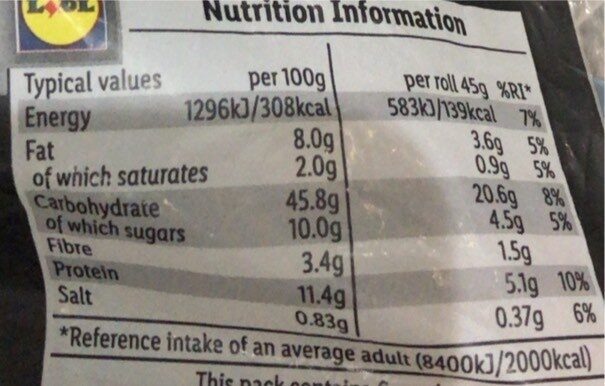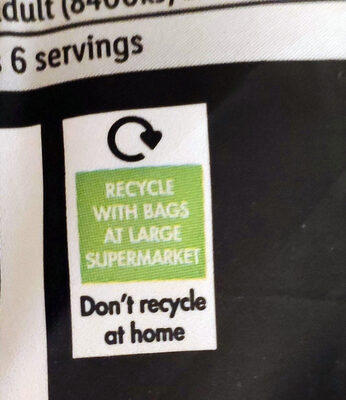Help us make food transparency the norm!
As a non-profit organization, we depend on your donations to continue informing consumers around the world about what they eat.
The food revolution starts with you!
Sliced brioche Hot Dog Rolls - Deluxe - 270g
Sliced brioche Hot Dog Rolls - Deluxe - 270g
This product page is not complete. You can help to complete it by editing it and adding more data from the photos we have, or by taking more photos using the app for Android or iPhone/iPad. Thank you!
×
Barcode: 4056489461968 (EAN / EAN-13)
Common name: Pre-sliced brioche hot dog rolls
Quantity: 270g
Brands: Deluxe
Categories: Plant-based foods and beverages, Plant-based foods, Snacks, Cereals and potatoes, Sweet snacks, Sweet pastries and pies, Breads, Viennoiseries, Brioches, Special breads, Hot dog buns
Labels, certifications, awards: Vegetarian
Stores: Lidl
Countries where sold: United Kingdom
Matching with your preferences
Health
Ingredients
-
29 ingredients
wheat flour ( wheat flour, calcium carbonate, thiamin, iron, niacin), free range egg 12%, sugar, rapeseed oil, water, invert sugar syrup, yeast, concentrated butter 1,5% ( milk ), skimmed milk powder, fermented wheat flour, wheat gluten, salt, milk protein, emulsifier (mono - and diglycerides of fatty acids, xanthan gum, soya lecithin), deactivated yeast, potato dextrin, colour (carotene), flour treatment agent (ascorbic acid), flavouringAllergens: Gluten, Milk, Soybeans
Food processing
-
Ultra processed foods
Elements that indicate the product is in the 4 - Ultra processed food and drink products group:
- Additive: E1400 - Dextrin
- Additive: E160a - Carotene
- Additive: E322 - Lecithins
- Additive: E415 - Xanthan gum
- Additive: E471 - Mono- and diglycerides of fatty acids
- Ingredient: Colour
- Ingredient: Emulsifier
- Ingredient: Flavouring
- Ingredient: Gluten
- Ingredient: Invert sugar
- Ingredient: Milk proteins
Food products are classified into 4 groups according to their degree of processing:
- Unprocessed or minimally processed foods
- Processed culinary ingredients
- Processed foods
- Ultra processed foods
The determination of the group is based on the category of the product and on the ingredients it contains.
Additives
-
E1400 - Dextrin
Dextrin: Dextrins are a group of low-molecular-weight carbohydrates produced by the hydrolysis of starch or glycogen. Dextrins are mixtures of polymers of D-glucose units linked by α--1→4- or α--1→6- glycosidic bonds. Dextrins can be produced from starch using enzymes like amylases, as during digestion in the human body and during malting and mashing, or by applying dry heat under acidic conditions -pyrolysis or roasting-. The latter process is used industrially, and also occurs on the surface of bread during the baking process, contributing to flavor, color and crispness. Dextrins produced by heat are also known as pyrodextrins. The starch hydrolyses during roasting under acidic conditions, and short-chained starch parts partially rebranch with α--1‚6- bonds to the degraded starch molecule. See also Maillard Reaction. Dextrins are white, yellow, or brown powders that are partially or fully water-soluble, yielding optically active solutions of low viscosity. Most of them can be detected with iodine solution, giving a red coloration; one distinguishes erythrodextrin -dextrin that colours red- and achrodextrin -giving no colour-. White and yellow dextrins from starch roasted with little or no acid are called British gum.Source: Wikipedia
-
E160a - Carotene
Carotene: The term carotene -also carotin, from the Latin carota, "carrot"- is used for many related unsaturated hydrocarbon substances having the formula C40Hx, which are synthesized by plants but in general cannot be made by animals -with the exception of some aphids and spider mites which acquired the synthesizing genes from fungi-. Carotenes are photosynthetic pigments important for photosynthesis. Carotenes contain no oxygen atoms. They absorb ultraviolet, violet, and blue light and scatter orange or red light, and -in low concentrations- yellow light. Carotenes are responsible for the orange colour of the carrot, for which this class of chemicals is named, and for the colours of many other fruits, vegetables and fungi -for example, sweet potatoes, chanterelle and orange cantaloupe melon-. Carotenes are also responsible for the orange -but not all of the yellow- colours in dry foliage. They also -in lower concentrations- impart the yellow coloration to milk-fat and butter. Omnivorous animal species which are relatively poor converters of coloured dietary carotenoids to colourless retinoids have yellowed-coloured body fat, as a result of the carotenoid retention from the vegetable portion of their diet. The typical yellow-coloured fat of humans and chickens is a result of fat storage of carotenes from their diets. Carotenes contribute to photosynthesis by transmitting the light energy they absorb to chlorophyll. They also protect plant tissues by helping to absorb the energy from singlet oxygen, an excited form of the oxygen molecule O2 which is formed during photosynthesis. β-Carotene is composed of two retinyl groups, and is broken down in the mucosa of the human small intestine by β-carotene 15‚15'-monooxygenase to retinal, a form of vitamin A. β-Carotene can be stored in the liver and body fat and converted to retinal as needed, thus making it a form of vitamin A for humans and some other mammals. The carotenes α-carotene and γ-carotene, due to their single retinyl group -β-ionone ring-, also have some vitamin A activity -though less than β-carotene-, as does the xanthophyll carotenoid β-cryptoxanthin. All other carotenoids, including lycopene, have no beta-ring and thus no vitamin A activity -although they may have antioxidant activity and thus biological activity in other ways-. Animal species differ greatly in their ability to convert retinyl -beta-ionone- containing carotenoids to retinals. Carnivores in general are poor converters of dietary ionone-containing carotenoids. Pure carnivores such as ferrets lack β-carotene 15‚15'-monooxygenase and cannot convert any carotenoids to retinals at all -resulting in carotenes not being a form of vitamin A for this species-; while cats can convert a trace of β-carotene to retinol, although the amount is totally insufficient for meeting their daily retinol needs.Source: Wikipedia
-
E322 - Lecithins
Lecithins are natural compounds commonly used in the food industry as emulsifiers and stabilizers.
Extracted from sources like soybeans and eggs, lecithins consist of phospholipids that enhance the mixing of oil and water, ensuring smooth textures in various products like chocolates, dressings, and baked goods.
They do not present any known health risks.
-
E322i - Lecithin
Lecithins are natural compounds commonly used in the food industry as emulsifiers and stabilizers.
Extracted from sources like soybeans and eggs, lecithins consist of phospholipids that enhance the mixing of oil and water, ensuring smooth textures in various products like chocolates, dressings, and baked goods.
They do not present any known health risks.
-
E415 - Xanthan gum
Xanthan gum (E415) is a natural polysaccharide derived from fermented sugars, often used in the food industry as a thickening and stabilizing agent.
This versatile food additive enhances texture and prevents ingredient separation in a wide range of products, including salad dressings, sauces, and gluten-free baked goods.
It is considered safe for consumption even at high intake amounts.
-
E471 - Mono- and diglycerides of fatty acids
Mono- and diglycerides of fatty acids (E471), are food additives commonly used as emulsifiers in various processed foods.
These compounds consist of glycerol molecules linked to one or two fatty acid chains, which help stabilize and blend water and oil-based ingredients. E471 enhances the texture and shelf life of products like margarine, baked goods, and ice cream, ensuring a smooth and consistent texture.
It is generally considered safe for consumption within established regulatory limits.
Ingredients analysis
-
May contain palm oil
Ingredients that may contain palm oil: Butterfat, E471, E160a
-
Non-vegan
Non-vegan ingredients: Free range eggs, Butterfat, Skimmed milk powder, Milk proteins
-
Vegetarian
No non-vegetarian ingredients detected
Unrecognized ingredients: Thiamin, Iron
-
Details of the analysis of the ingredients
: wheat flour (wheat flour, calcium carbonate, thiamin, iron, niacin), free range egg 12%, sugar, rapeseed oil, water, invert sugar syrup, yeast, concentrated butter 1.5%, skimmed milk powder, wheat flour, wheat gluten, salt, milk protein, emulsifier (mono- and diglycerides of fatty acids, xanthan gum, soya lecithin), deactivated yeast, potato dextrin, colour (carotene), flour treatment agent (ascorbic acid), flavouring- wheat flour -> en:wheat-flour - vegan: yes - vegetarian: yes - ciqual_proxy_food_code: 9410 - percent_min: 25.36 - percent_max: 79
- wheat flour -> en:wheat-flour - vegan: yes - vegetarian: yes - ciqual_proxy_food_code: 9410 - percent_min: 5.072 - percent_max: 79
- calcium carbonate -> en:e170i - vegan: maybe - vegetarian: maybe - percent_min: 0 - percent_max: 39.5
- thiamin -> en:thiamin - percent_min: 0 - percent_max: 26.3333333333333
- iron -> en:iron - percent_min: 0 - percent_max: 19.75
- niacin -> en:e375 - vegan: maybe - vegetarian: maybe - percent_min: 0 - percent_max: 15.8
- free range egg -> en:free-range-eggs - vegan: no - vegetarian: yes - ciqual_food_code: 22000 - percent_min: 12 - percent: 12 - percent_max: 12
- sugar -> en:sugar - vegan: yes - vegetarian: yes - ciqual_proxy_food_code: 31016 - percent_min: 1.5 - percent_max: 10
- rapeseed oil -> en:rapeseed-oil - vegan: yes - vegetarian: yes - from_palm_oil: no - percent_min: 1.5 - percent_max: 10
- water -> en:water - vegan: yes - vegetarian: yes - ciqual_food_code: 18066 - percent_min: 1.5 - percent_max: 10
- invert sugar syrup -> en:invert-sugar-syrup - vegan: yes - vegetarian: yes - percent_min: 1.5 - percent_max: 10
- yeast -> en:yeast - vegan: yes - vegetarian: yes - percent_min: 1.5 - percent_max: 10
- concentrated butter -> en:butterfat - vegan: no - vegetarian: yes - from_palm_oil: maybe - ciqual_food_code: 16401 - percent_min: 1.5 - percent: 1.5 - percent_max: 1.5
- skimmed milk powder -> en:skimmed-milk-powder - vegan: no - vegetarian: yes - ciqual_food_code: 19054 - percent_min: 0 - percent_max: 1.5
- wheat flour -> en:wheat-flour - vegan: yes - vegetarian: yes - ciqual_proxy_food_code: 9410 - percent_min: 0 - percent_max: 1.5
- wheat gluten -> en:wheat-gluten - vegan: yes - vegetarian: yes - percent_min: 0 - percent_max: 1.5
- salt -> en:salt - vegan: yes - vegetarian: yes - ciqual_food_code: 11058 - percent_min: 0 - percent_max: 0.83
- milk protein -> en:milk-proteins - vegan: no - vegetarian: yes - percent_min: 0 - percent_max: 0.83
- emulsifier -> en:emulsifier - percent_min: 0 - percent_max: 0.83
- mono- and diglycerides of fatty acids -> en:e471 - vegan: maybe - vegetarian: maybe - from_palm_oil: maybe - percent_min: 0 - percent_max: 0.83
- xanthan gum -> en:e415 - vegan: yes - vegetarian: yes - percent_min: 0 - percent_max: 0.415
- soya lecithin -> en:soya-lecithin - vegan: yes - vegetarian: yes - ciqual_food_code: 42200 - percent_min: 0 - percent_max: 0.276666666666667
- deactivated yeast -> en:deactivated-yeast - vegan: yes - vegetarian: yes - percent_min: 0 - percent_max: 0.83
- potato dextrin -> en:potato-dextrin - vegan: yes - vegetarian: yes - percent_min: 0 - percent_max: 0.83
- colour -> en:colour - percent_min: 0 - percent_max: 0.83
- carotene -> en:e160a - vegan: maybe - vegetarian: maybe - from_palm_oil: maybe - percent_min: 0 - percent_max: 0.83
- flour treatment agent -> en:flour-treatment-agent - percent_min: 0 - percent_max: 0.83
- ascorbic acid -> en:e300 - vegan: yes - vegetarian: yes - percent_min: 0 - percent_max: 0.83
- flavouring -> en:flavouring - vegan: maybe - vegetarian: maybe - percent_min: 0 - percent_max: 0.83
- wheat flour -> en:wheat-flour - vegan: yes - vegetarian: yes - ciqual_proxy_food_code: 9410 - percent_min: 25.36 - percent_max: 79
Nutrition
-
Good nutritional quality
⚠ ️Warning: the amount of fruits, vegetables and nuts is not specified on the label, it was estimated from the list of ingredients: 5This product is not considered a beverage for the calculation of the Nutri-Score.
Positive points: 8
- Proteins: 5 / 5 (value: 11.4, rounded value: 11.4)
- Fiber: 3 / 5 (value: 3.4, rounded value: 3.4)
- Fruits, vegetables, nuts, and colza/walnut/olive oils: 0 / 5 (value: 5.75, rounded value: 5.8)
Negative points: 9
- Energy: 3 / 10 (value: 1296, rounded value: 1296)
- Sugars: 2 / 10 (value: 10, rounded value: 10)
- Saturated fat: 1 / 10 (value: 2, rounded value: 2)
- Sodium: 3 / 10 (value: 332, rounded value: 332)
The points for proteins are counted because the negative points are less than 11.
Nutritional score: (9 - 8)
Nutri-Score:
-
Nutrient levels
-
Fat in moderate quantity (8%)
What you need to know- A high consumption of fat, especially saturated fats, can raise cholesterol, which increases the risk of heart diseases.
Recommendation: Limit the consumption of fat and saturated fat- Choose products with lower fat and saturated fat content.
-
Saturated fat in moderate quantity (2%)
What you need to know- A high consumption of fat, especially saturated fats, can raise cholesterol, which increases the risk of heart diseases.
Recommendation: Limit the consumption of fat and saturated fat- Choose products with lower fat and saturated fat content.
-
Sugars in moderate quantity (10%)
What you need to know- A high consumption of sugar can cause weight gain and tooth decay. It also augments the risk of type 2 diabetes and cardio-vascular diseases.
Recommendation: Limit the consumption of sugar and sugary drinks- Sugary drinks (such as sodas, fruit beverages, and fruit juices and nectars) should be limited as much as possible (no more than 1 glass a day).
- Choose products with lower sugar content and reduce the consumption of products with added sugars.
-
Salt in moderate quantity (0.83%)
What you need to know- A high consumption of salt (or sodium) can cause raised blood pressure, which can increase the risk of heart disease and stroke.
- Many people who have high blood pressure do not know it, as there are often no symptoms.
- Most people consume too much salt (on average 9 to 12 grams per day), around twice the recommended maximum level of intake.
Recommendation: Limit the consumption of salt and salted food- Reduce the quantity of salt used when cooking, and don't salt again at the table.
- Limit the consumption of salty snacks and choose products with lower salt content.
-
-
Nutrition facts
Nutrition facts As sold
for 100 g / 100 mlAs sold
per serving (45g)Compared to: Hot dog buns Energy 1,296 kj
(308 kcal)583 kj
(139 kcal)+12% Fat 8 g 3.6 g +80% Saturated fat 2 g 0.9 g +232% Carbohydrates 45.8 g 20.6 g -8% Sugars 10 g 4.5 g +60% Fiber 3.4 g 1.53 g +19% Proteins 11.4 g 5.13 g +28% Salt 0.83 g 0.373 g -28% Fruits‚ vegetables‚ nuts and rapeseed‚ walnut and olive oils (estimate from ingredients list analysis) 5.75 % 5.75 %
Environment
-
Eco-Score B - Low environmental impact
⚠ ️Select a country in order to include the full impact of transportation.The Eco-Score is an experimental score that summarizes the environmental impacts of food products.→ The Eco-Score was initially developped for France and it is being extended to other European countries. The Eco-Score formula is subject to change as it is regularly improved to make it more precise and better suited to each country.Life cycle analysis
-
Average impact of products of the same category: A (Score: 88/100)
Category: Rolls for hamburger/hotdog (buns), prepacked
Category: Rolls for hamburger/hotdog (buns), prepacked
- PEF environmental score: 0.21 (the lower the score, the lower the impact)
- including impact on climate change: 1.70 kg CO2 eq/kg of product
Stage Impact Agriculture
77.1 %Processing
17.1 %Packaging
0.6 %Transportation
4.9 %Distribution
0.4 %Consumption
0.0 %
Bonuses and maluses
-
Missing origins of ingredients information
Malus: -5
⚠ ️ The origins of the ingredients of this product are not indicated.
If they are indicated on the packaging, you can modify the product sheet and add them.
If you are the manufacturer of this product, you can send us the information with our free platform for producers.
-
Missing packaging information for this product
Malus: -15
⚠ ️ The information about the packaging of this product is not filled in.⚠ ️ For a more precise calculation of the Eco-Score, you can modify the product page and add them.
If you are the manufacturer of this product, you can send us the information with our free platform for producers.
Eco-Score for this product
-
Impact for this product: B (Score: 68/100)
Product: Sliced brioche Hot Dog Rolls - Deluxe - 270g
Life cycle analysis score: 88
Sum of bonuses and maluses: -20
Final score: 68/100
-
Carbon footprint
-
Equal to driving 0.9 km in a petrol car
170 g CO² per 100g of product
The carbon emission figure comes from ADEME's Agribalyse database, for the category: Rolls for hamburger/hotdog (buns), prepacked (Source: ADEME Agribalyse Database)
Stage Impact Agriculture
80.8 %Processing
10.9 %Packaging
0.4 %Transportation
7.6 %Distribution
0.3 %Consumption
0.0 %
Packaging
-
Missing packaging information for this product
⚠ ️ The information about the packaging of this product is not filled in.Take a photo of the recycling information Take a photo of the recycling information
Transportation
-
Origins of ingredients
Missing origins of ingredients information
⚠ ️ The origins of the ingredients of this product are not indicated.
If they are indicated on the packaging, you can modify the product sheet and add them.
If you are the manufacturer of this product, you can send us the information with our free platform for producers.Add the origins of ingredients for this product Add the origins of ingredients for this product
Report a problem
-
Incomplete or incorrect information?
Category, labels, ingredients, allergens, nutritional information, photos etc.
If the information does not match the information on the packaging, please complete or correct it. Open Food Facts is a collaborative database, and every contribution is useful for all.
Data sources
Product added on by kiliweb
Last edit of product page on by inf.
Product page also edited by alia, chevalstar, ecoscore-impact-estimator, openfoodfacts-contributors, yuka.sY2b0xO6T85zoF3NwEKvlhAWceSP_hzYEwHWyUmxwP2AE5XZceFVx6zzP6s, yuka.sY2b0xO6T85zoF3NwEKvlkVDcMbPhTPrER76uWewwsiDdaHLP8Bo0obIA6s.
